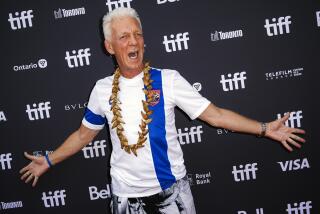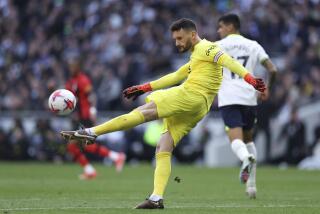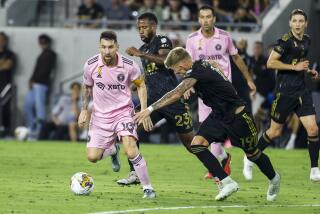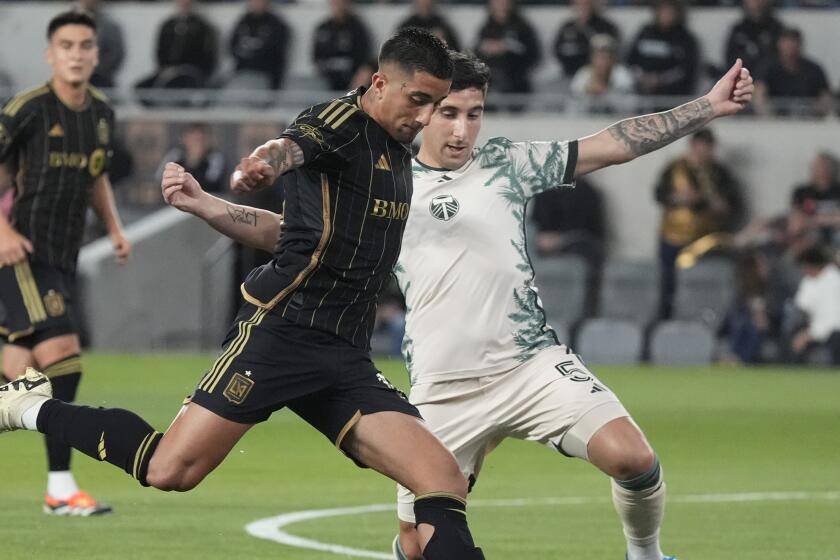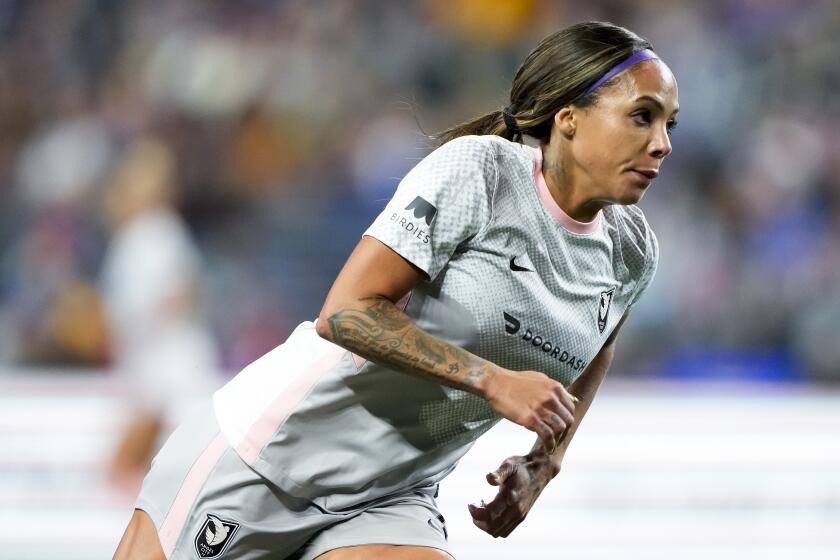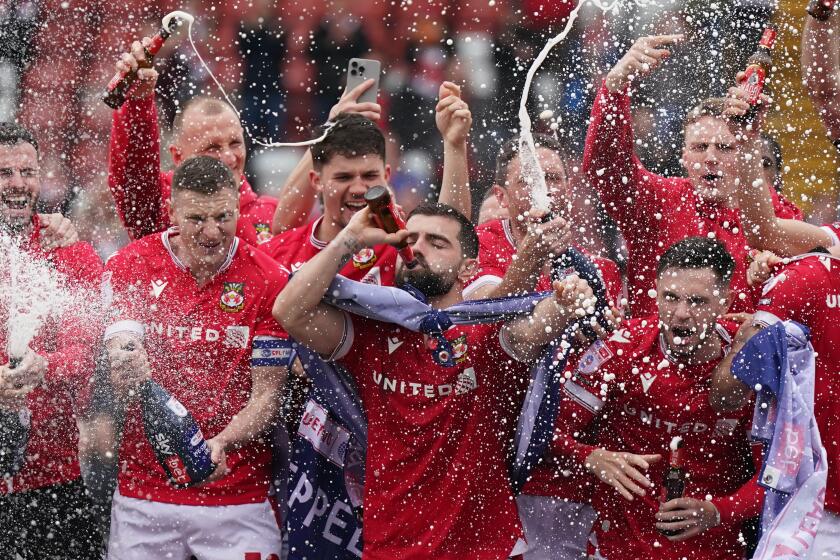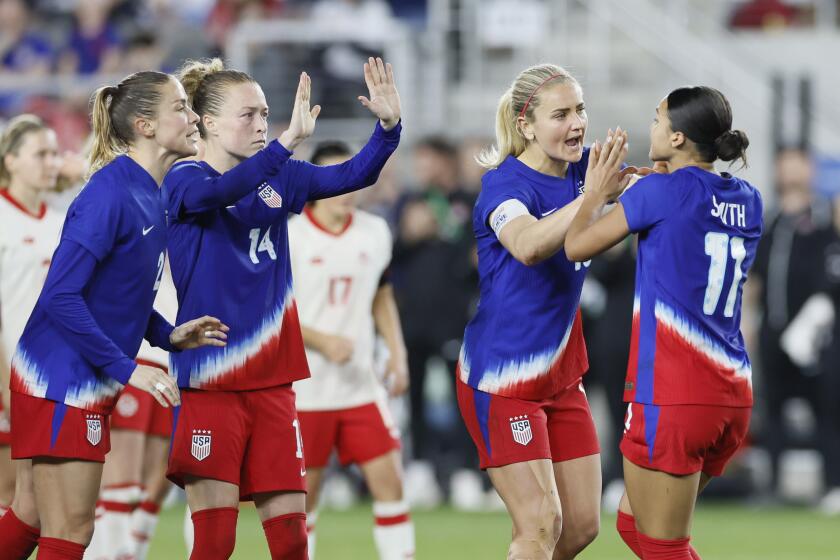Opportunity Has Its Knocks : Soccer: Former UCLA standout Caligiuri is uncertain about his big chance to play in Germany.
Once slammed in his face just as he was prepared to enter, the door to one of soccer’s most prestigious professional leagues, Germany’s Bundesliga, is now open to Paul Caligiuri. But as evidence that life’s bounces can be unpredictable, he hesitates at the threshold.
He has committed only to making a decision by the end of this week while home in Los Angeles to play for the U.S. national team in the eight-team, 16-game CONCACAF (Confederation of North and Central American and Caribbean Assn. Football) Gold Cup Friday through July 7.
The United States will begin play Saturday night at the Rose Bowl against Trinidad and Tobago, a team that has less than fond memories of Caligiuri. It was his goal against Trinidad and Tobago at Port of Spain, Trinidad, in 1989 that gave the United States a 1-0 victory and its first World Cup berth in 40 years.
If he decides in favor of the Bundesliga, his first Gold Cup game might also be his last because his German team, Hansa Rostock, expects him to report for training camp in early July.
Although he once considered playing in Germany’s first division as the opportunity of a lifetime, Caligiuri, 26, said this week that he might prefer to remain home with the national team as it builds toward the 1994 World Cup in the United States.
“I really don’t know which way I’m leaning,” he said. “I need to talk to the coach over there, see what his plans are, see whether the offer is right, then sit down with my wife and decide. I gave myself this week to think this thing over.”
Four years ago, Caligiuri would not have thought twice. In fact, he didn’t when a Bundesliga team, Hamburg SV, offered the former UCLA co-captain a contract. But before the first game, the team hired a new coach who thought he needed an experienced Yugoslavian goalkeeper more than he needed an inexperienced American midfielder.
Caligiuri didn’t leave Germany, simply the first division. He played with a second-division team, SV Meppen, for two years before returning to the United States in 1989 to play for the national team.
He became one of the most consistent players on a team that qualified for the World Cup, and although the United States didn’t come close to winning any of its three games last summer in Italy, he played well enough to attract an offer from Rostock in the East German first division, the Oberliga.
In recent years, the Oberliga has been dominated by Dynamo Berlin, which selected the country’s best players by order of the team’s sponsor--the secret police or Stasi. But with the Berlin Wall coming down, and the Stasi in disrepute, there was a more level playing field in East Germany last season, which literally was the Oberliga’s last season.
With the reunification of East and West Germany, the Oberliga merged into the Bundesliga. The champion and runner-up from East Germany earned places for next season in the 18-team first division. Hansa Rostock won the championship, which became Caligiuri’s guaranteed ticket into the Bundesliga.
“It’s tempting,” he said. “Who in my position wouldn’t want to play in that league?”
As a bonus, Hansa Rostock earned a berth as the Oberliga champion into the exclusive European Cup, which could give him an opportunity to play against the champions from several other countries.
Still, he hesitates.
Although there no longer is an East Germany, Rostock still is in the east of Germany. Living conditions in that Baltic Sea port city might not be quite as desperate as in other areas of eastern Germany, but neither is it like living in Southern California.
“I was there strictly for soccer, which was a good thing because there was nothing easy about the lifestyle,” he said. “My wife and I lived in a simple apartment, similar to government housing here, which is the way most people in Rostock live.”
His only luxury was a Honda automobile, provided by one of the team’s sponsors.
“Most of the people there drive (East German-manufactured) Trabants,” he said. “They had to be on a waiting list for about 10 years to get one. When they got one, they found it wasn’t much better than a riding lawn mower. It’s made of plastic and fiberglass and has an engine a little bigger than a motorcycle’s. If you get hit in one, you’re history.
“You can get one now for $100 or a case of champagne.”
Even in the weeks after the Oct. 3 reunification, Caligiuri said it was difficult to find food in the markets. When a supermarket chain from the west opened a store in Rostock in January, Caligiuri said his teammates, all from the east, were astonished.
“They’d never seen a cantaloupe or a melon or a kiwi,” he said.
The experience was an education for Caligiuri as well, but now that he has done it, he said he doesn’t know whether he wants to put himself and his wife through it again.
Also, he said he has a feeling that something good is happening with the U.S. national team under its new coach, Bora Milutinovic. The team is not winning all of its games, but it is playing with more poise and confidence and attracting large crowds.
“It’s exciting,” he said. “I’d like to be part of it.”
Milutinovic said Tuesday that he would like to have Caligiuri on his team, but can wait until 1993 if the midfielder decides to return to Germany for another season.
“For him, it’s very important to play against excellent competition,” Milutinovic said. “If he can play in the Bundesliga and the European Cup, that’s very exciting for him.
“If the money is OK, I’ll go with him.”
Soccer Notes
In a ceremony Tuesday at City Hall, Mayor Tom Bradley declared June 28-July 7 “CONCACAF Gold Cup Week” in Los Angeles. Initially, he said CONCAF. “Did I get that wrong?” he asked. He eventually got it right. . . . The champion will receive $100,000, which U.S. captain Peter Vermes said would be split equally among 20 players should the United States win. . . . U.S. Coach Bora Milutinovic coached Costa Rica in the 1990 World Cup. Costa Rica is the U.S. opponent on July 3 at the Coliseum. Asked if his knowledge of his former team would help his current players, he said, “No, because I don’t play.”
